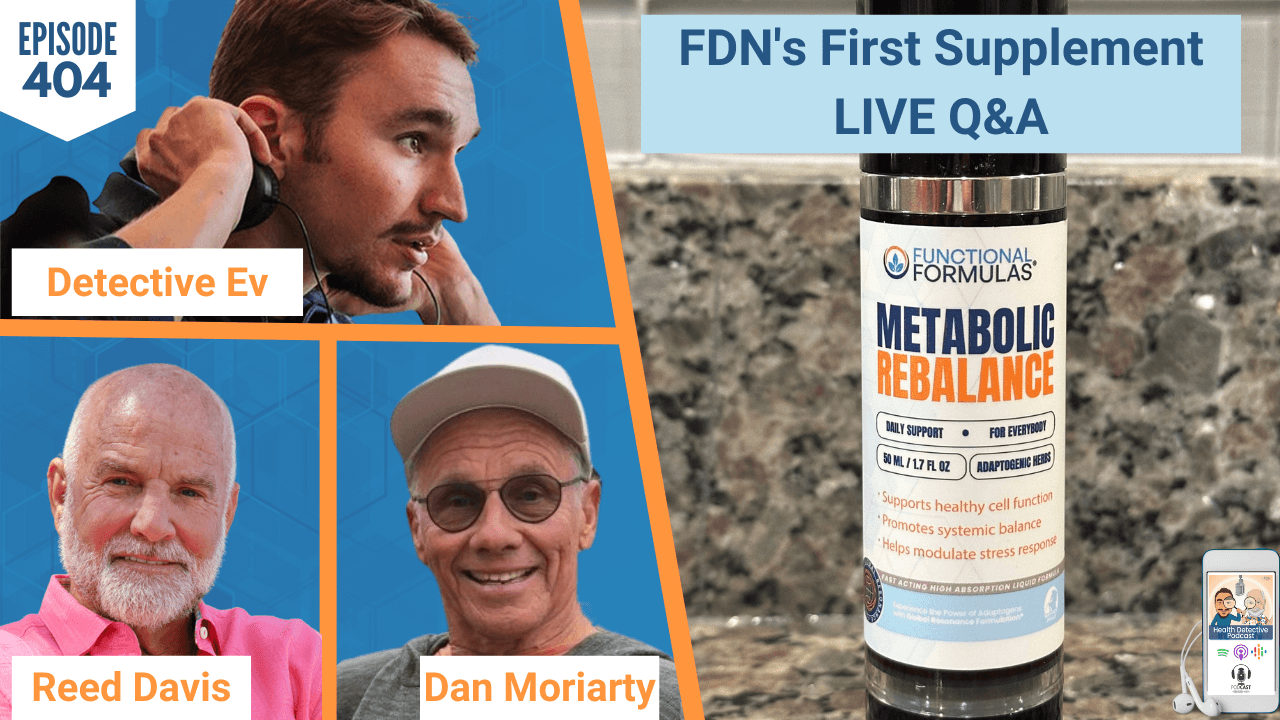Chronic illness in the US has been growing at an alarming rate over the past few decades. It is a sign that many people aren’t taking proper care of themselves. Many blame genetics or circumstances for their poor health. But in most cases, this is an excuse that is preventing them from restoring their health. The good news is that there are thing you can do to improve health that are simple.
Modern, allopathic medicine is focused primarily on chasing and treating symptoms. But this model doesn’t work. As a result, most people believe that they are destined to struggle with symptoms. Restored health seems unachievable.
What most people fail to understand is that optimal health doesn’t have to be out of reach. Unhealthy lifestyle habits are almost always at the root of chronic symptoms and health challenges. We all can change the lifestyle habits that are making us sick!
Living a healthy lifestyle that promotes good health is the best way to prevent disease and restore your energy and vitality.
What does optimal health look like?

When your body is in a state of optimal health, every area of the body is functioning at its best, free from any malfunctions. In this state, you are unlikely to develop any symptoms or disease. When you are in this state, you experience a life filled with energy and vitality. Living a lifestyle that promotes optimal health allows your body to function the way it was designed to.
It may sound simple, but modern life makes it difficult to achieve by presenting us with many tempting opportunities to prevent us from living at our best. On top of that, there is plenty of misinformation being spread by the pharmaceutical and processed food industries which make it difficult to uncover the truth and recognize the importance of a healthy lifestyle.
If you want to live the kind of lifestyle that promotes optimal health, there are 7 things you need to do. You have complete control over every one of them. Even if you are already experiencing significant health issues, working on these 7 areas can help you build a strong foundation that will help you restore your health.
1. Proper breathing
Each of the trillions of cells in the human body requires a steady flow of oxygen to function properly and survive. Oxygen is so important to our health that we’ll die if we go more than a few minutes without it! Because of this, even a slight reduction in proper breathing can have a significant impact on your health.

Even though we can breathe without having to think about it, many people breathe shallowly and don’t get the full amount of oxygen needed to fuel their cells. Elements of modern life, such as stress, poor posture, and poor diet, are common, and all prevent proper breathing.
Getting less oxygen than the body needs can have a big impact on overall health. And most people are unaware of how common improper breathing is and how it may be impacting them. Because of this, it is important to become more mindful about breathing and practice better breathing techniques throughout the day to improve the amount of oxygen getting to the cells.
2. Getting plenty of water
Following oxygen, water is the next most crucial element of human survival. A human being can only survive without water for a few days without water. Going without it for more than just a few days will cause death.

About two-thirds of our body weight is from water. This means that a 200-pound man would have approximately 130 pounds of water in his body! Water is found throughout all the tissue and fluids of the body. And it is essential for the proper function of vital organs and glands. Even mild dehydration can lead to symptoms while more severe cases of dehydration can cause disease.
Water plays an important role in supporting brain function, digestion, immunity, detoxification, and muscle and joint function. But unlike breathing, our body doesn’t automatically draw in water. We must consciously try to drink it. Despite the easy access to water that many of us have, dehydration plays a large role in the poor health and disease that is so prominent in modern society.
To maintain good hydration, aim to drink half your body weight in ounces of water every day. If you’re active, it should be even more. For example, if you weigh 160 pounds you would need to drink approximately 80 ounces of water every day.
3. Eating the right foods
Food is another essential element needed to sustain life. We can only survive several weeks without food.

We’ve all experienced the painful hunger that makes it impossible to forget our need to eat. But hunger doesn’t help us to choose quality foods. In fact, it usually encourages us to reach for unhealthy foods. Poor nutrition is common in modern society and is another major reason why poor health and chronic illness are so common. The sugar, chemical toxins, and artificial additives found in many of today’s foods certainly don’t help either.
The cells in our body are influenced by the food we eat. The cells need proper nutrients from natural, whole foods such as meat, fish, fruit, and vegetables, nuts, and seeds. Without those nutrients, the cells won’t develop or function properly. This leads to poor health and disease.
We all need healthy, whole foods in our diet. But each of us requires different types and proportions of the foods we eat. This science-based philosophy, referred to as Metabolic Typing, can make a significant difference in your health.
4. Mindset
Thoughts tend to build on each other and culminate into strong emotions. It’s often the first thought of this sequence that dictates if the resulting emotions are positive or negative. All it takes is one seemingly harmless negative thought to invoke a chain of increasingly negative thoughts that lead to anger, frustration, or depression. We have as many as 50,000 thoughts per day, and that’s a lot of opportunities to make ourselves miserable!

Thoughts and emotions can directly influence the release of hormones and neurotransmitters in the body. These substances can have a significant effect on your health and state of mind. Negative thoughts and the resulting emotions activate a stress response in the body. By causing stress, negative thoughts provoke a physiological response that breaks the body down.
If this response is triggered often enough, the stress that’s causing it will ultimately lead to chronic health problems. Most people let their thoughts run on autopilot. Becoming aware of negative, repetitive thought patterns allows you to begin changing those patterns. This can lead to a decrease in stress which contributes to chronic symptoms and illness.
5. Good sleep
Anyone who deprives themselves of adequate sleep is painfully reminded of it when they wake up the following morning. The fatigue, soreness, and irritability that often result can last the entire day, and sometimes longer. If this happens on a consistent basis, it begins to impact overall health.
During sleep, the immune system ramps up. Physical damage within the body is repaired, and thoughts and memories are processed. Sleep helps us recover from the demands of a busy day and refreshes us so that we’re ready for the next day.

With the fast pace of modern life, many people take sleep for granted. It is common and even applauded to sacrifice sleep to get more done. But the additional amount of time spent awake puts more burden on the body. And it increases the body’s need for recovery.
Getting more sleep is one of the easiest and least expensive ways to improve your health and vitality. All you must do is commit to developing good sleep habits. Turn off the television or computer earlier. Don’t lay in bed at night scrolling on your phone. Set a sleep schedule.
6. Getting regular sunlight
Our ancestors spent most of each day in the sun. Nowadays many of us go out of our way to avoid sun exposure because of the high prevalence of skin cancer. But we do need regular exposure to sunlight. The vitamin D that’s naturally produced from sun exposure is critical to the immune system’s ability to prevent cancer growth.

Vitamin D is not a vitamin, but a pre-hormone. It controls the expression of more than 10% of our genes, and in turn, has a significant impact on our health. Vitamin D deficiency has been associated with many health problems including cancer, heart disease, autism, rheumatoid arthritis, osteoporosis, and many others.
Unfortunately, most people don’t get enough sun exposure to produce an adequate amount of vitamin D. And those who do often block vitamin D production by using sunscreen. To support optimal health, you should regularly aim to get at least 15 to 20 minutes of sun exposure without sunscreen during the middle of the day. The amount of sun exposure you need and can withstand without burning depends on the darkness of your skin. Be sure to avoid sunburn. If you know you’ll be in the sun for longer than you can tolerate, use a natural sunscreen that blocks both UVA and UVB radiation.
7. Regular exercise
Getting regular exercise certainly plays a significant role in optimal health. But many people make the mistake of thinking that exercise will compensate for other poor lifestyle habits. This simply isn’t true. Spending hours on the treadmill may offset weight gain from a poor diet, but it won’t offset all the other effects it will have on your health. In many cases, this type of exercise mentality can even make your health worse.

As part of a well-rounded lifestyle, exercise is important based on the simple fact that we’re built to move. It improves circulation, immunity, mental clarity, and in general, the physical resilience of the body. Each of these exercise benefits helps improve health and increases happiness.
One of the biggest problems with exercise is a lack of moderation. Many people either don’t exercise at all or exercise way too much. Keep in mind that poor health will diminish your exercise capacity and that exceeding your capacity will cause poor health to deteriorate even further. Based on this, be sure to stay within your limits. For some people, this could mean only being able to engage in the mildest forms of exercise.
Start With the Basics
Achieving excellent health doesn’t have to be the elusive achievement that some people make it out to be. Changing these 7 things can help you build a healthy foundation. You have the power to control each of these areas. But to make positive changes will require time and effort on your part.
There’s no excuse to not get started immediately!
When disease or poor health is a concern, these 7 things are always likely to be a part of the root cause. While some people will need to look beyond lifestyle to improve health, these 7 areas should always be considered in any attempt at achieving your health goals. This applies whether the goal is to simply feel better or to reverse a life-threatening condition.







